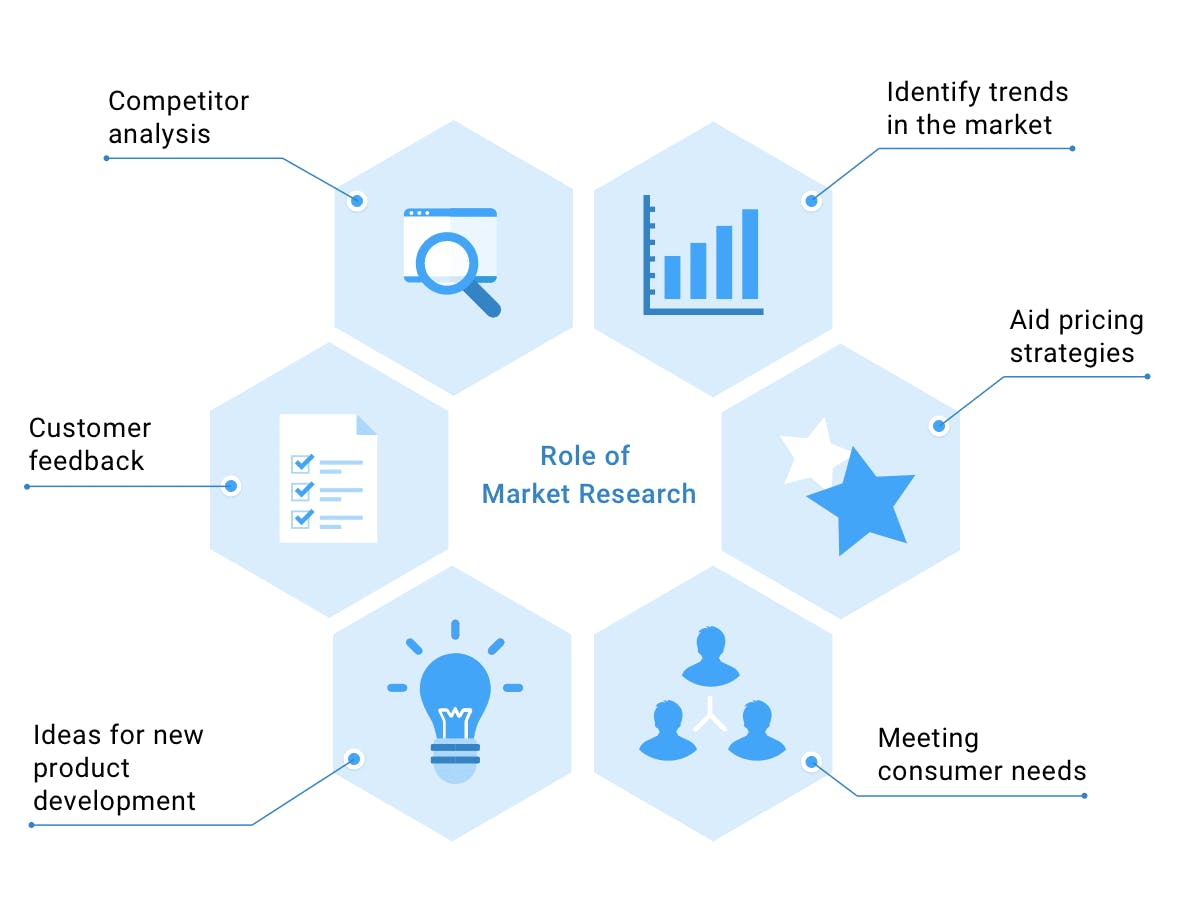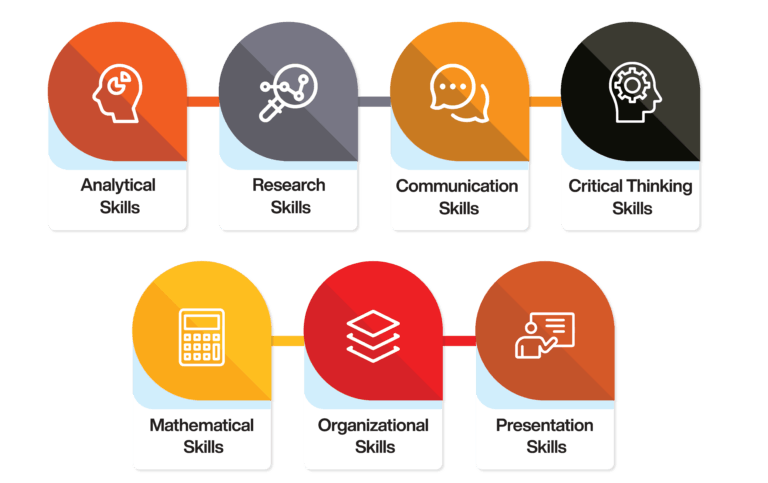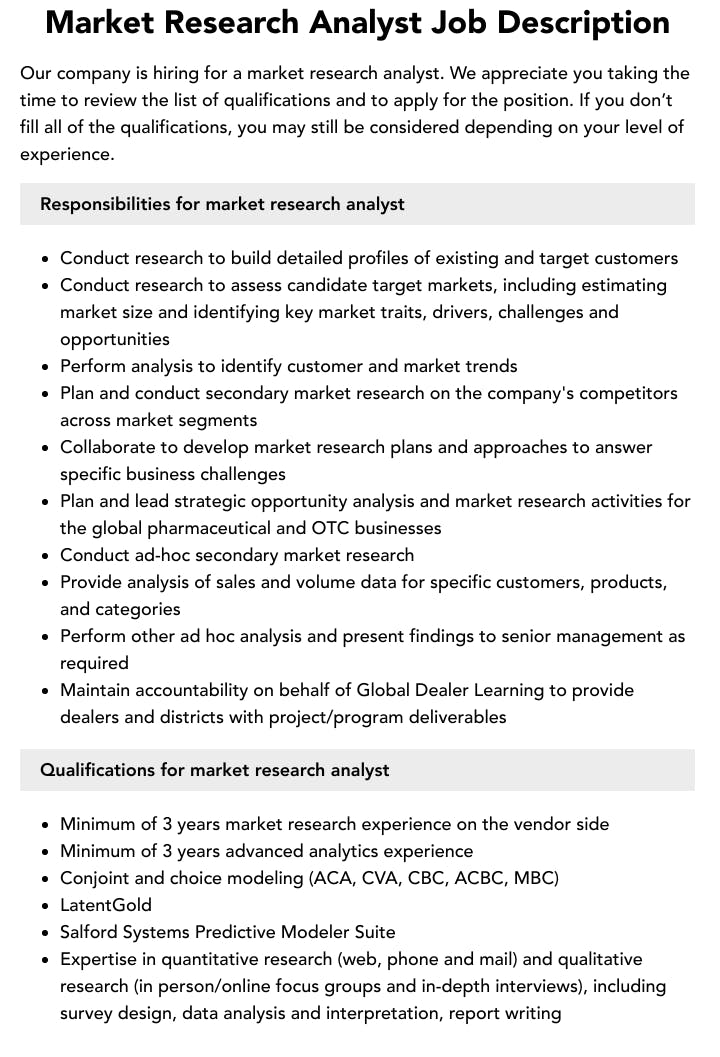Market research analyst: responsibilities and skills
Jul 20th, 2023

Contents
What is a market research analyst?
Market research analyst responsibilities
Market research analyst skills and background
How to find the right market research analyst?
Modern businesses use data and statistics to inform pricing decisions, determine target demographics and personalize consumer experiences. Companies perform in-depth studies to examine potential sales of products and services, stay ahead of the competition, and monitor changing market conditions and customer preferences.
Turning the gathered data into useful recommendations requires a certain set of skills in various fields, including data science, marketing, business administration, and psychology. Therefore, businesses need a specific person with these skills who will be responsible for conducting research and interpreting the results. This role is assigned to a market research analyst.
According to the U.S. Bureau of Labor Statistics, market research analyst employment is predicted to increase by 19% between 2021 and 2031, much higher than the average for all professions. As a result, over the next ten years, there are expected to be, on average, 99,800 new jobs for market research specialists. In this article, we will tell about the specifics of this profession, key requirements, duties, and skills that should be listed in the job description.

What is a market research analyst?
A market research analyst is a specialist who studies consumer preferences, economic circumstances, and other factors to predict potential sales of a product or service. A professional helps businesses understand customer needs and determine the prices consumers are ready to pay for various competing offers. A specialist also helps companies develop the most effective product marketing strategies to increase potential sales.
A market research analyst monitors and forecasts market, sales, and advertising trends, gathers and examines data on consumers and rivals, and evaluates the performance of marketing initiatives and opportunities. Then a specialist creates reports, tables, and diagrams to turn complex data into actionable insights. Finally, a market research analyst presents these findings to company executives, marketing leaders, and other stakeholders.
A specialist is often involved in a product’s entire life cycle, from the initial stages of research and development to the point of sale and beyond. Market research analysts study sales and market trends to find correlations. It might include identifying the season during which a particular product is in high demand or planning out rivals’ pricing strategies.
Now we will dwell more on a market research analyst’s primary responsibilities, skills, and background.
Market research analyst responsibilities
Market research analyst responsibilities cover a wide range of tasks that help convert raw data into valuable insights for business. This role typically includes the activities we will list below.
Collecting quantitative and qualitative data
The daily responsibilities of research analysts include collecting information from internal and external sources, such as accounting and sales systems. Specialists also use secondary research data, such as statistics on the sector released by trade groups, government organizations, and consulting companies, that may help gain an overview of rivals and potential customers.
Market research analysts employ traditional and digital means to collect the data necessary to come to practical conclusions about the products and services they are examining. Traditional data collection methods include focus groups, opinion polls, surveys, and questionnaires, while common digital means for gathering information are keyword research and social media listening.
At the collection stage, data is typically unprocessed. The analyst’s task is to check the accuracy and ensure it conveys crucial information. Moreover, a professional creates and assesses data collection methods. This entails establishing focus groups, developing and conducting polls, and distributing questionnaires to participants.
Analyzing information
Once market research analysts obtain the necessary data, they use statistical, analytical, and mathematical models to uncover relevant information. These procedures usually require the use of computers and specific software. Data analysis enables specialists to divide consumers into more focused, smaller groups that are more likely to react similarly to particular marketing techniques.
The information may reveal problems in the way a business interacts with clients, leading to negative experiences. Research analysts use the collected data to help companies make more informed business decisions that involve product development, sales, and marketing. With data analysis, professionals can identify patterns, evaluate the success of marketing initiatives, and forecast future sales and marketing trends.

Interpreting data
While most of the time, market research analysts study consumer behavior and examine competitors, they also need to take a step back and interpret their findings. The analyst creates a picture of the company's position in the market and designs a course to get from point A to point B while taking into account the client company's broad objectives. They translate statistical and qualitative research results so that company decision-makers can understand them.
Market research analysts interpret the data they gather using sophisticated software and statistical methods. They organize this information into reports and tables to present what they’ve learned and discuss its importance from a business standpoint. Specialists create forecasts, reports, graphs, and other visual aids to convey their findings to the company’s executives and stakeholders. Professionals visually represent market trends and rivals’ activities so businesses can forecast how well their goods and services will perform.
Presenting the findings
Then specialists present the data to the team members involved in product and package design, marketing, and advertising. Reporting implies demonstrating the findings using dashboards, white papers, and presentations. Finally, market research analysts report their results to senior research staff and executives and provide recommendations concerning research and development, product and service updates, advertising campaigns, and other marketing issues.
In addition, a business must maintain market research data for future use. Marketing specialists can use gathered data as a source of precise information for market research. The analyst’s task is to create and keep a market and competitor information database. Moreover, market research analysts often develop strategies and techniques for collecting, storing, and managing data. The other critical aspect of the job is to ensure proper data management, protection, and governance through collaboration with data security professionals.

Collaborating with other team members
Finally, market research analysts measure the effectiveness of marketing campaigns. They work with sales representatives, customer service, and other sales support departments to determine how the suggested changes have affected purchases, comments, reviews, and other post-sale contacts with target customers.
In addition to these activities, specialists help implement analytics tools, a critical component in developing the business analytics sector. The usual step in this tool selection process is identifying the technologies that best meet the company’s demands. A few well-known tools include Apache Zeppelin, Matomo, and BIRT.
The tasks and responsibilities of research analysts vary across different businesses and industries. Analysts collect valuable information to help companies achieve objectives, from increasing performance to reducing costs using data-driven mathematical models.
Market research analyst skills and background
This job requires a mix of experience and education. Let us discuss the essential skills and experiences the hiring manager should look for in the ideal market analyst candidate.
Bachelor’s degree in market research
According to the Bureau of Labor Statistics, a candidate for this position requires a bachelor's degree in market research or communications. A degree provides systematic knowledge that is crucial for the field. However, a candidate for a market research analyst’s role can have a background in business administration, mathematics, statistics, or social sciences, such as sociology or psychology.
A market research analyst should have a thorough grasp of human behavior and psychology to predict how consumers will behave and react to a company’s products and marketing activities. This is because not all business questions can be answered by market research.
Data analysis and research skills
Data analysis is the core component of this specialist’s job. Therefore, a professional should be familiar with the following four forms of data analysis: descriptive, predictive, diagnostic, and prescriptive data analysis. Moreover, a specialist should possess an excellent knowledge of statistical tools, such as SPSS, R, MATLAB, and Minitab.
The other crucial skill for a market researcher is called coding. It is the method of classifying open-ended survey responses to simplify data analysis. Research can address several areas, such as consumer research, including primary and secondary, examining present and potential markets, studying rival products, and evaluating your target market's perceptions of advertising throughout the marketing campaign.
Experience in conducting surveys and interviews
Although market research analysts often deal with data that companies already have, in some cases, they should collect new information. Thus, they must be proficient in several data collection methods. Analysts should have excellent interview skills, know how to create surveys and manage collected data. In addition, professionals should know how to use social media platforms to conduct surveys, identify target markets and connect with a larger audience.

Perfect communication skills
Discovering business insights to improve marketing and sales strategies is one of the main goals of market research. However, in a corporate setting, data isn't always sufficient. Therefore, a market research analyst requires perfect communication skills to present findings to designers, sales, and marketing teams. Additionally, they communicate with senior stakeholders and members of top management. Therefore being able to explain complicated ideas and concepts to a broad audience is useful to them.
Data visualization skills
Besides communication skills, a market research analyst should be able to produce data visualizations. These are visual depictions of datasets that emphasize important patterns or conclusions from the data. A specialist should be familiar with data visualization programs like QlikView and Tableau that help organize and communicate information to non-experts. They enable stakeholders with little or no experience in data analysis to understand the job carried out by market research analysts.
In the following section of this article, we will describe the steps you need to take to find the ideal candidate for this role.
How to find the right market research analyst?
After learning about a market research analyst’s responsibilities, skills, and background, it is time to focus on hiring the best specialist for this position.
Step 1. Create a compelling job description
Although a specialist’s responsibilities typically vary depending on the company, a general outline should include: keeping track of and predicting sales trends, evaluating the success of marketing initiatives and sales tactics, coordinating with the marketing and sales teams to establish promotional goals, creating and distributing surveys and opinion polls. Besides, a professional’s day-to-day duties should also include analyzing the findings of various polls and surveys, researching rivals and assessing the effectiveness of their tactics, and evaluating consumer preferences.
We have already described the list of necessary skills but do not underestimate the value of soft skills for your market research analyst. These are organizational and time management, leadership, empathy, problem-solving, and interpersonal skills.

Step 2. Pay attention to relevant education
When considering CVs and interviewing candidates, look for a bachelor’s degree in marketing or statistics and two or three years of experience. Nevertheless, a master's degree may be necessary for senior-level positions.
If a candidate has a recognized marketing analyst certificate, it is a beneficial advantage. For example, The Certified Market Research Analysis title is given by IIMRA to specialists who have completed at least three years of study in a marketing degree program. However, we advise you to employ experienced marketing analysts even if they don't have formal degrees or certifications. They can prove their proficiency in the position through a skills exam or provide testimonials or references from a previous employer.
Step 3. Consider relevant experience and skills
Ask a potential candidate about their experience conducting primary research for your specific industry or with the same target audience that will participate in the market research for your business. Focus on the work they have completed during the last two years.
Then describe a problem your company is trying to solve and ask what approaches they might suggest. A candidate can tell about a comparable study that used the same method to achieve the same goal.
Step 4. Keep in mind your business goals
It is crucial to find the right candidate who will tailor the activities to address specific research questions for your company and help you achieve the objectives. To get the best results, choose someone who can work with your research question and your budget to identify the finest methodology.
We hope you found our advice on hiring the right market research analyst practical, as it can be challenging unless you have extensive expertise in the position. Once you find the best candidate, you will be able to improve your communication with customers, develop more effective data-driven marketing strategies, spot new trends, and identify growth opportunities.
